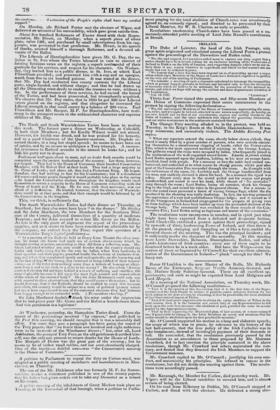IRELAND.
The Duke of Leinster, the bead of the Irish Peerage, with great spirit originated and circulated among the Liberal Peers a protest against the proceedings of the Downshire and Roden cabal.
"We, the undersigned, feel ourselves called upon to express our deep regret that a notice should have been issued, calling for an exclusive meeting of the Protestants of Ireland in Dubbn on the 24th of January, and seggesting dangers which we do not be- lieve there is any reason whatever to apprehend, and which we feel assured not one single fact can be adduced to prove. ° We lament that is duty has thus been imposed on us of protesting against a requi. sultan is hich eight Members of the House of Lords have deemed it expedient to publish on the very eve of the meetiug of Parliament. "We consider a meeting of such a character calculated to interrupt the tranquillity which at present happily prevails in Ireland, nod intended only to bias the discussion of measures which we believe to be necessary for tile promotion of the national in. terests, and which we hope will occupy the earliest and most dispassionate attention of the Legislature. 'Jan. 12.1237. "LEINSTER," Thirty-four Peers signed this protest, and fifty-seven Members of the House of Commons expressed their entire concurrence in the protest by signing the following declaration- .. We, the undersigned Members of time House of Commons, representing the coun- ties, cities, and boroughs in Ireland, attached to our names respectively, do hereby, on our own behalf and on that of our constituents, express our cordial thanks to the Duke of Leinster, and the other noblemen who signed the preceding declaration, and our entire concurrence in the sentiments contained therein."
The Orange-Tory meeting alluded to in the protest, was held on Tuesday, in the King's Room at the Dublin Alansionhouse. It was very numerous, and excessively violent. The Dublin Evening Post says- " When our reporters entered the room, shortly before eleven o'clock, they found it nearly filled by a great number of persons, who were actively exercis- ing themselves by a simultaneous clapping'. of hands, called the Conservative Fire, which is the most approved method of rejoicing in the Orange Lodges. The galleries round the room were occupied by ladies, who frequently joined in the acclamation-of the well-organized crowd below. Exactly at.eleven o'clock Lord Roden appeared upon the platform, holding to his nose an orange hand- kerchief, lined with purple. For a moment or two the noble lord seemed em- barrassed, and undecided as to what course he shoul4 pursue, whilst peal after peal of the Conservative Fire resounded through the room. As if caught with the enthusiasm of the scene, his Lordship took the Orange handkerchief from his nose, and suddenly elevated it above his head. In a moment the signal was taken. Almost every man in the crowd pulled out his orange and purple handkerchief, and waved it over his head, while shouts of No surrender!' rung through the room ; Lord Roden, losing all restraint, shook his Orange flag to the wind, and mixed his voice in the general chorus. For a minute or two the round room presented a forest of waving Orange flags, whilst the din produced by the shouting was really deafening. In fact, the meeting presented the appearance of a vast and multitudinous Orange lodge; and it seemed as if all the Orangemen itt Ireland had congregated fur the purpose of giving vent to those feelings which have been bottled up since the pretended abolition of the Orange body. The ceremonial was concluded by three rotunda of the Con- servative Fire ; Lord Roden acting as fugleman and master of the ceretnonies."
The resolutions were twenty-two in number, and in spirit just what might have been expected from a defeated and desperate faction. Lord Charleville exhibited a protest against their proceedings, signed by upwards of thirty landowning Peers of Ireland, and then threw it on the ground, stamping and trampling on it like a fury, amidst the frenzied shouts of the meeting. This was the principal incident ; and it sufficiently marks the character of the assembly. At this meeting were Lords Downshire, Behnore, Donoughmore, Roden, and other Lords-Lieutenant of Irish counties: every one of them ought to be dismissed before he is a week older. But have the Whigs—even the section of them so bepraised by O'Connell for their excellent adminis- tration of the Government in Ireland—" pluck" enough for this? We fancy not.


























 Previous page
Previous page